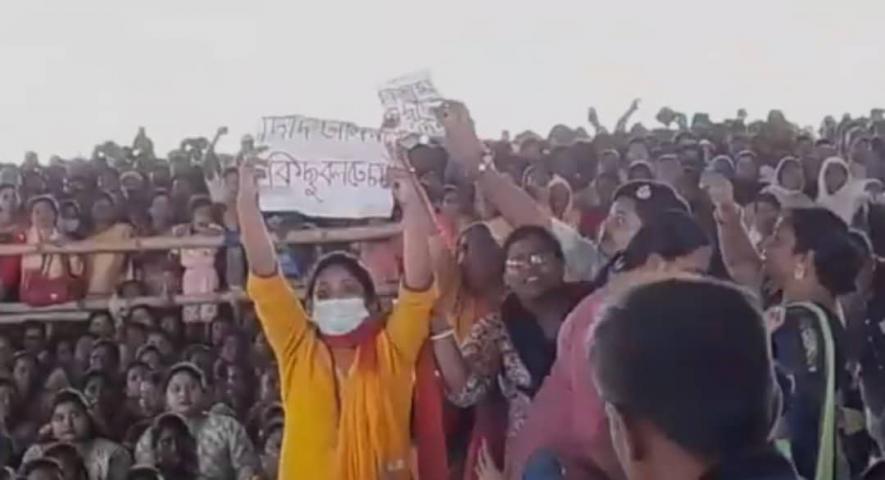Bengal: Corruption in School Service Commission – An Auditor’s View

SSC protest in Bengal. (File Photo)
It was undoubtedly a historic verdict by the division bench of Hon’ble Justices Debangshu Basak and Mahammad Shabbar Rashidi of Calcutta High Court on April 22, 2024, cancelling the appointments of over 25,000 teaching and non-teaching staff made by the West Bengal School Service Commission (SSC).
The verdict was based on the gross irregularities found by the CBI enquiry earlier ordered by the HC in four cases involving appointment of Group D, Group C, High and Higher Secondary Teachers/ Headmasters from the panels prepared on the results of selection test conducted by the SSC in 2016.
All the panels of 2016 have been cancelled resulting in cancellation of appointments, and thereby loss of jobs of 25,735 people. The irregularities brought out are -- the SSC has never published any merit list with the marks obtained by the candidates, has not preserved OMR (Optical Mark Recognition) sheets or databank from scanned OMR, has given appointment to those who submitted blank OMR (blank answer sheets), those from outside the panel and after expiry of the panel etc. SSC also violated Articles 14 and 16 in selecting, not in open tender.
The verdict, which has resulted in the loss of close to 26,000 government jobs in a state that has hardly provided any gainful employment to its citizens during its 10-year tenure, has created a stir on the socio-politico-economic fronts in Bengal. People from all sections have expressed worries and anxieties, particularly about those who got the job by fair means, such as writing the examination and obtaining qualifying marks.
The SSC chairman, too, has expressed worries about the legal appointments. Ironically, he is the person who heads the organisation that is responsible for all that has happened. He has been issuing confusing statements about submission of list/lists containing names of ineligible candidates who obtained the appointment fraudulently. He is reported to have claimed that they could know the figure of about 5,000 illegal appointees only from CBI, implying that SSC did not have the exact figure for submission to the court.
Hence, his statement that SSC submitted such a list to the court is a great lie. How could he do so in the absence of OMR/databank of scanned copies of OMR and other records destroyed by his office for obvious reasons? This is reflected in the verdict, which said: “SSC, State and Board have perseveringly non-cooperated so that even the possibility of trying to separate the grain from the chaff could be rendered nugatory.”
Worries and anxieties about any injustice likely to be meted out to the eligible/fit appointment holders also came under the Bench’s consideration: “We have given anxious consideration to the passionate plea that persons who had obtained the appointments legally would be prejudiced if we cancel the entire selection process.”
In spite of such a sympathetic view, “attempting to sift the grain from the chaff becoming inconsequential, we are left with the only option of cancelling all appointments in the four categories,” the bench said.
The demand for justice to the eligible, therefore, could not be met because it is not possible to segregate them from the lot who are eligible.
It is in this connection that one would like to mention the salient points of the Comptroller and Auditor General’s (CAG) observations in “IT audit on Integrated Online Examination System of West Bengal Central School Service Commission” contained in CAG’s Report No.6 of 2018.
The West Bengal SSC was constituted under West Bengal School Service Commission Act, 1997, entrusted with the job of recruitment of teaching and non-teaching employees for state-aided schools. It introduced the Online Integrated Examination System (OIES) from 2009 with a view to computerising the entire recruitment process. The recruitment process was done through Regional Level Selection Tests (RLSTs) conducted at five regional offices.
After the introduction of the online system, the SSC held 12 RLSTs, of which the results of 10 were published till June 2017. An IT audit was conducted between January and July 2017 through review of records and analysis of data pertaining to nine tests excluding the 12th RLST, as the data supplied by the commission in respect of 12th lacked completeness, containing no academic and examination details, transaction tables, tables relating to marks of examinations and final panel list, imposing thereby a limitation in the scope of audit and analysis of data to frame audit observations.
What are the audit findings in respect of the nine tests?
The head-wise observations on irregularities as under (I) General Control are (i) Absence of User Requirement Specification (URS), System Development Life Cycle and Data Dictionary, (ii) Absence of a proper Business Continuity Plan, (iii) Failure to establish the Virtual Private Network connectivity that posed a serious risk to data confidentiality, (iv) Problem of retention of physical records of the examination process, (v) Issues relating to Access Control causing (a) failure to ensure transparency and fair competition resulting in selection of ineligible candidates, (b) Unauthorised change in caste category of candidates, resulting in violation of reservation rules-general caste candidates appointed in SC reserved posts (c) Difference between marks to be awarded as per formula and marks calculated by the system -unpardonable irregularities leading to empanelment of ineligible candidates numbering 429, 479, 483, 641,and 451 in Eastern, Northern, Southern, Western and South-Eastern Regions, respectively, by increasing the score for some and decreasing for some others and (d) Unfair selection for Personality Test-while many ineligible candidates were called for PT, many eligible ones were deprived; (II) irregularities under Application Controls are-(i) Non-synchronisation between regional data and central database leading to employment of ineligible candidates-scrutiny of data at CSSC level was inadequate, (ii) Absence of Audit Trail and proper log files- no audit trail embedded in the system, and it failed to capture in the system details of log-in and log-out of the users, (iii) Absence of proper Validation Controls causing various types of inconsistencies and incompleteness in data.
The audit also pointed out limitations in the database, such as a good number of duplicate tables, blank tables provided to audit.
The CAG concluded: “Thus, there were various areas of control weaknesses and business rules violations in the IT Application used by WBCSSC, which renders the results of the system unreliable. In course of discussions in the exit conference in September, 2017 the Chairman of SSC accepted the audit findings and assured to look into the matter and comply with recommendations that include rectification of the deficiencies in the system, getting the matter investigated thoroughly and initiating appropriate action against the persons responsible. The matter was referred to the government in September, 2017 itself. But no action on the recommendations appears to have been taken by SSC or the State Government.”
The same set of irregularities came out in the CBI enquiry, which has been the basis of the HC verdict of cancelling the entire panel pertaining to WB SSC’s 2016 State Level Selection Test (SLST), resulting in the loss of 26,000 jobs.
It becomes clear that in the matter of recruitment of teaching and non-teaching staff of the government-aided schools, the state government, under Mamata Banerjee, allegedly cheated the people from the beginning of her regime, as reflected from the analysis of results of 10th, 11th and 12th RLSTs.
Also, it transpires that SSC and the state government, in spite of their full knowledge about the loopholes of the online system, used the same for SLST 2016, allegedly aimed at taking advantages of the snags to reap benefits for those involved in the racket. A “racket”of this magnitude could not have operated for a decade or so without support from the authorities at the helm.
The reaction of the Chief Minister to the court verdict also speaks volumes. She was in Raiganj campaigning for Parliament elections at the time of the HC judgement. As soon as heard about the verdict, she began venting with words that were reportedly derogatory and contemptuous of the court. She said: “I do not accept the verdict,” terming BJP as a “job eater” and alleging that CPM and Congress had joined hands to cancel the jobs of 26,000 people etc.
The Chief Minister continued her tirade in other campaigns, sometimes even distorting the content of the order that all of those who lost their jobs, would have to pay back the entire amount drawn. She is putting all the blame on the court.
Interestingly, while people across sections of the society, are worried about the job loss of ‘eligible’ persons, Banerjee is batting for ‘ineligible’ ones too, because they have allegedly paid hefty amounts to her party and its leaders. The officials helping her also are being given “protection”. Note, that the Chief Secretary avoided giving permission for instituting corruption cases against them in the High Court.
In the Supreme Court, the Chief Justice of India, while denying a stay on the verdict, spoke in the same voice as the Calcutta HC Division Bench, and put a question mark on whether the recruitment process was a deceitful one and a means of deceiving the job seeking youths. The conjectures of CJI are vindicated by the findings of CAG.
One hopes the real culprits, who have been in the business of deceiving poor jobseekers in Bengal for a decade or so, are brought to justice soon.
The writer is a former IAS officer and PAC Chairman on citizenship issues. The views expressed are personal.
Get the latest reports & analysis with people's perspective on Protests, movements & deep analytical videos, discussions of the current affairs in your Telegram app. Subscribe to NewsClick's Telegram channel & get Real-Time updates on stories, as they get published on our website.
























